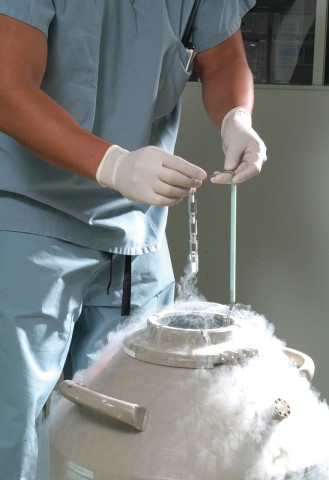 Techniques are available to freeze or cryopreserve human eggs and embryos for use in future treatment scenarios.
Techniques are available to freeze or cryopreserve human eggs and embryos for use in future treatment scenarios.
Human eggs are frozen to preserve fertility prior to medical treatments for cancer and other issues that can negatively affect egg viability. They are also frozen to preserve fertility in cases where reproduction may wish to be delayed since egg quality and genetic issues can become compromised with advancing maternal age. Frozen eggs are also used in some cases to facilitate the “egg donation” process for couples seeking eggs from healthy, fertile donors.
Embryo cryopreservation is a very well established technique and allows for preserving the embryos from an assisted reproductive cycle for several reasons. In some cases, all embryos are cryopreserved as the replacement of fresh embryos in a stimulated cycle may be contraindicated because of patient illness or an elevated estradiol level, which may predispose the patient to hyperstimulation. In most cases, spare good quality embryos remaining after a fresh transfer are frozen and this alleviates the need for the patient to go through another cycle of ovarian stimulation. It is often more cost-efficient to pursue frozen embryos that have already been created than to initiate another entire cycle of medications and oocyte retrieval. The policy at GENESIS is to freeze only embryos that meet minimum quality criteria and this is determined by your physician.
GENESIS uses state-of-the art “vitrification” technology to freeze both eggs and embryos.
Embryo cryopreservation maximizes the stimulation and retrieval process without the transfer of too many fresh embryos, thereby lowering the risk of a multifetal gestation. GENESIS will freeze extra cleaved embryos or blastocysts created during a fresh cycle, that are of good quality. If the fresh cycle fails, the frozen embryos can be thawed at a later date in hope of establishing a pregnancy.


